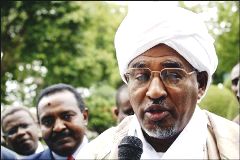Sudan govt agrees to bigger AU force in Darfur
By Dino Mahtani
ABUJA, Aug 25 (Reuters) – Sudan’s government agreed in a breakthrough at peace talks on Wednesday to allow more African Union troops to enter the Darfur region to confine rebel fighters to their bases, a possible precursor to disarmament.
 Sudan’s top government negotiator made the announcement at the talks in Nigeria, which had earlier been threatened with failure by the rebels’ refusal to discuss being moved back to base by Sudanese government forces.
Sudan’s top government negotiator made the announcement at the talks in Nigeria, which had earlier been threatened with failure by the rebels’ refusal to discuss being moved back to base by Sudanese government forces.
“They may need more forces, besides protection of their monitors, to help cantonment and protection of the rebels and we agree about that,” said government negotiator Majzoub al-Khalifa Ahmed [photo], who is also Agriculture Minister.
He said the exact number of troops would be decided later.
Sudan has already agreed to 300 AU troops in Darfur with a mandate to protect AU monitors of a widely disregarded ceasefire with rebels, but had previously rejected an AU disarmament role.
The proposal by AU chairman and Nigerian President Olusegun Obasanjo was to send some 2,000 AU troops to garrison rebels, while Khartoum disarmed the pro-government Janjaweed militia.
The United Nations says the Darfur conflict has created the world’s worst humanitarian crisis, with more than a million people driven from their homes and up to 50,000 killed.
Khalifa said disarming the Janjaweed had already begun.
Khartoum is under pressure from an Aug. 30 deadline set by the U.N. Security Council to show progress in protecting civilians and disarming the Janjaweed or face sanctions.
“One thing that would be a real disaster is for the international community to feel absolutely dissatisfied with the handling of events by the government of Sudan to the extent that they will have to unleash something more than what we are trying to manage,” Obasanjo said.
U.N. Sudan envoy Jan Pronk said the world body was not entirely happy about the government’s implementation of its commitments in Darfur so far.
“We met together yesterday in New York in a closed informal session and we said with regards to…implementation in Darfur itself, our assessment is mixed,” he said at a news conference in Khartoum.
Analysts were positive about the latest government move at the peace talks.
“It is certainly a major step forward and it will contribute to the easing of pressure from the Security Council,” said Alex Vines, head of the Africa programme at London’s Royal Institute of International Affairs.
CONFLICT
Darfur rebels began an armed revolt against the government in February 2003 after years of conflict between Arab nomads and African farmers over scarce resources in the arid region.
They want a greater role for Darfur minorities in government which they say is dominated by Arab Sudanese from the north.
Obasanjo said he pushed for the AU to keep rebels in their bases because he doubted Khartoum could do so without bloodshed.
Rebel negotiators did not say if they would accept the plan.
“We decided to leave this issue as observed. When we come to this point later on in the agenda, we will clarify it,” said Ahmed Mohammed Tugod, a negotiator for the rebel Justice and Equality Movement.
But he joined human rights groups in calling for an even wider mandate for AU troops: “We accept AU forces to protect civilians and guarantee security.”
Khalifa repeated Khartoum’s position that only the government was permitted to protect civilians.
Having spent the first three days of talks in the Nigerian capital setting an agenda, the two sides adjourned until Thursday at 10 a.m. (0900 GMT) to begin the talks proper.
The first item on the agenda is access for humanitarian aid for Darfur refugees. Rights groups have accused Khartoum of restricting food and medical supplies to the refugees housed in several makeshift camps in the vast desert region, although international monitors say access is improving.
The issue of disarmament and confining rebels to base will be addressed after that, and this will be followed by talks on political and socio-economic matters including development.
